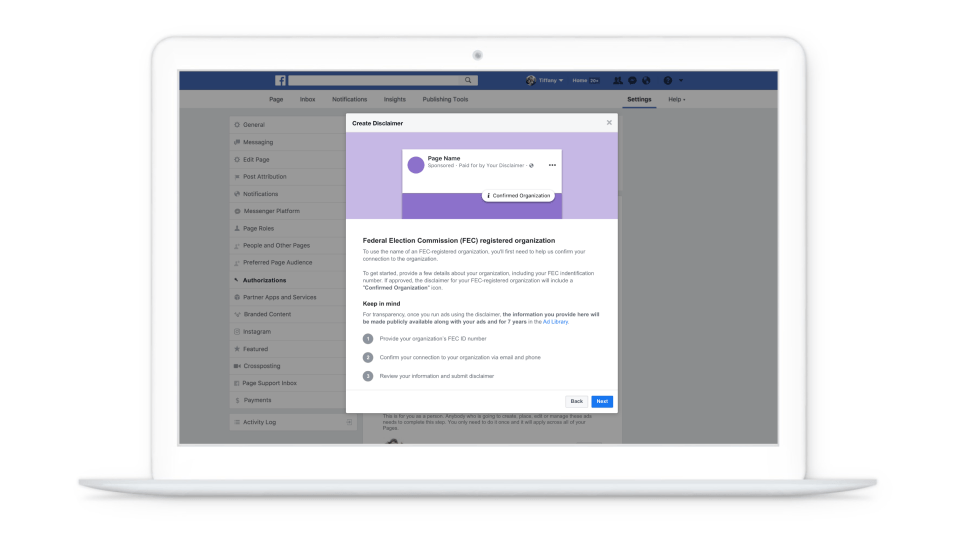By Katie Harbath, Public Policy Director, Global Elections, and Sarah Schiff, Product Manager
Learn more about political ads and how Facebook is protecting elections.
Update on October 16, 2019 at 9:00AM PT:
Based on feedback from advertisers, we are working to make the new US “Paid for by” ad disclaimer creation process more efficient. To help ensure all advertisers have time to go through the authorization process, we are extending our deadline to become compliant to November 7, 2019.
Originally published on August 28, 2019 at 3:00AM PT:
People should know who is trying to influence their vote and advertisers shouldn’t be able to cover up who is paying for ads. That’s why over the past few years, we’ve made important changes to help ensure more transparency and authenticity in ads about social issues, elections or politics.
Today, we’re sharing additional steps we’re taking to protect elections and prepare for the US 2020 election. Those steps include strengthening the authorization process for US advertisers, showing people more information about each advertiser and updating our list of social issues in the US to better reflect the public discourse on and off Facebook.
New Disclaimer Requirements
In 2018, we started requiring advertisers to get authorized before running ads about social issues, elections or politics. We also save those ads in an Ad Library so they’re publicly available for seven years.
The authorization process already requires advertisers in the US to provide identification to confirm who they are and where they are located. Advertisers must also place a “Paid for by” disclaimer on their ads to communicate who is responsible for them. Despite these requirements, there are a number of cases where advertisers have attempted to put misleading “Paid for by” disclaimers on their ads. That’s why, starting mid-September, advertisers will need to provide more information about their organization before we review and approve their disclaimer. If they do not provide this information by mid-October, we will pause their ads. While the authorization process won’t be perfect, it will help us confirm the legitimacy of an organization and provide people with more details about who’s behind the ads they are seeing.
Advertisers will have five options for providing more information, three of which demonstrate they are registered with the US government. If they choose one of the three government resource options, they will be allowed to use their registered organization name in disclaimers and the “i” icon that appears in the upper right-hand corner of their ads will read “Confirmed Organization.”
In addition to providing their US street address, phone number, business email and a business website matching the email, they must provide one of the following:
- Tax-registered organization identification number (i.e. EIN)
- A government website domain that matches an email ending in .gov or .mil
- Federal Election Commission (FEC) identification number

We also want to ensure advertisers who may not have those credentials, such as smaller businesses or local politicians, are able to run ads about social issues, elections or politics. Advertisers can also choose one of the following two options:
- Submit an organization name by providing a verifiable phone number, business email, mail-deliverable address and a business website with a domain that matches the email.
- Provide no organizational information and rely solely on the Page Admin’s legal name on their personal identification document. For this option, the advertiser will not be able to use a registered organization name in disclaimers.
For advertisers that choose one of these two options, the “i” icon will read “About this ad” instead of “Confirmed Organization.”
The “i” icons help people on Facebook and Instagram better understand who’s trying to influence them and why. Now, with one tap, people will not only see information about the ad, but they’ll be able to see the information Facebook confirmed, such as whether an advertiser used an EIN or FEC identification number. This will allow people to confidently gauge the legitimacy of an organization and quickly raise questions or concerns if they find anything out of the ordinary.
Updating Social Issues in the US
We are also refreshing the list of social issues in the US to a list of 10 categories, rather than 20 distinct subject areas. As we noted when we first announced this policy, the list is meant to be fluid to reflect the public discourse around social issues on and off Facebook that seek to influence public opinion through advocacy, debate or discussion. We also left it intentionally broad as we worked to refine it over time. Today’s update will bring the US list in line with issue lists in countries who have recently held elections. The shift from 20 subjects to 10 categories does not mean that our authorization process will be less restrictive. We’ll continue to capture a range of topics encompassed by the 10 referenced categories. For instance, in the Civil and Social Rights category, we will continue to proactively detect and review ads on topics like freedom of religion, LGBTQ rights and women’s rights.
You can see more examples in our Help Center.
We have also improved our enforcement based on feedback. For example, in the case of ads that discuss, debate or advocate for environmental issues, ads that merely encourage people to recycle or highlight sustainable products won’t require these additional steps in order to run. If an ad goes further, however, and advocates for or against things like legislation or a ballot initiative, the authorization requirement will continue to apply. As noted, the categories are evolving, so even while we narrow the policy in some areas, we may expand it in others.
These efforts to refine the policy will also apply outside of the US in places that have applicable categories.
Looking Forward
Over the coming months, we’ll share more information on our efforts to make elections safer and provide greater transparency on the ads and content people see on Facebook. These updates will include:
- More enhancements to our Ad Library, such as making it easier to track and compare spending of US presidential candidates
- Expanding our policy to prohibit ads that expressly discourage people in the US from voting, a commitment we made as part of a recent civil rights audit (found on page 20 here)
- Requiring all Pages for national candidates or elected officials to go through Page Publishing Authorization, which requires that Page administrators turn on two-factor authentication and verify their primary country location so that we can confirm these Pages are using real accounts and are located in the US
- Exposing more information about a Page, such as the business or organization behind it
We know we can’t tackle these challenges alone. That’s why we’re calling for sensible regulation and working directly with governments, watchdogs and regulators.
While our efforts to protect elections are ongoing and won’t be perfect, they will make it harder for advertisers to obscure who is behind ads and will provide greater transparency for people. We’ll continue to share updates as we take steps to protect people ahead of the 2020 US election and beyond.



